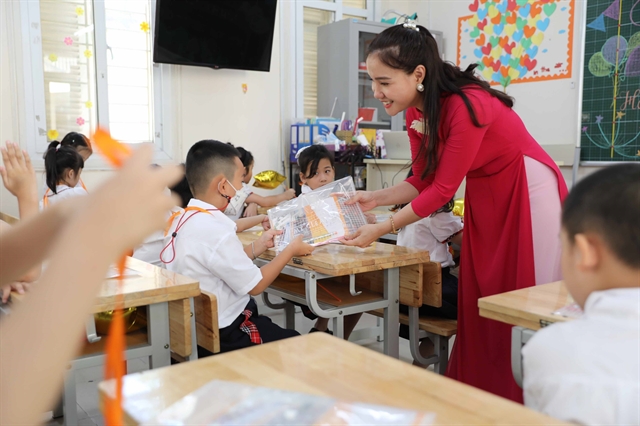 Society
Society

 |
| A teacher gives a present to her first-grade students at the Thăng Long Primary School in Hoàn Kiếm District, Hà Nội. VNA/VNS Photo Thanh Tùng |
HÀ NỘI — At the conference to summarise the school year 2022-2023 for primary education, the Ministry of Education and Training (MoET) revealed that over 52,000 grade one students did not pass the first grade.
Some people argue that this was a positive signal because students were assessed correctly, but some others raised concerns that a new studying programme and textbooks are too difficult, putting much pressure on students.
The new assessment model has four levels: excellent, good, complete, and incomplete.
In the school year 2022-2023, a total of 105,734 primary school students across the country could not complete the curriculum, accounting for 1.14 per cent of the total of over 9.2 million.
Of which, as many as 52,456 first graders, accounting for 2.9 per cent of the country's 1,763,961 first graders, did not complete the curriculum.
In the Vietnamese subject alone, some 49,700 students were assessed as incomplete, followed by mathematics with 39,022 children being similarly graded.
These figures lead to people’s concerns about the quality of teaching and the abilities of grade one students to learn the new education programme approved in 2018.
Thái Văn Tài, director of the Department of Primary Education under the MoET, said that the assessment was not very different from other years.
Students in grade one are ranked as "incomplete" more than in other grades, with the numbers decreasing in grades two, three, and so on.
First graders likely suffered the most as this was the first year of school with many requirements that are new to them.
It was also the year creating a solid foundation for students to learn new skills in the following years.
The MoET’s view is to strictly manage the first grade, because if it is loose, it will create a gap leading to irreparable risks later, including the risk of illiteracy.
Before the last school year, survey results show that about two per cent of five-year-old children had not attended preschool, most of them were in remote areas and areas with special difficulties.
Without going to kindergarten, children will face more difficulties when entering grade one.
The school year of 2022-2023 was also the first one that students nationwide can go to school in person after the COVID-19 pandemic, more or less affecting the overall quality.
Tài said the assessment of students as "incomplete" was not due to the curriculum or textbooks.
When designing a new general education programme, experts and education managers paid attention to the students of grade one to make appropriate adjustments.
For example, the Vietnamese subject was adjusted from 350 lessons per school year to 420 lessons per school year, but the content of knowledge was not increased. That is, there is still the same content, but the practice time was increased so that students can more easily understand the content.
Schools must make plans for students who did not pass to make up for the knowledge gap. This is to ensure the rights of students.
Tài emphasised that localities needed to create conditions for all five-year-old students, especially those ones in remote areas, to access preschool programmes.
Currently, about two per cent of them are not able to attend preschool, making it very difficult for them to enter grade one.
The MoET is collecting comments on the draft circular on teaching the Vietnamese language to children of ethnic groups before entering grade one.
Under the circular, the preschool education programme will be connected with the primary one.
Associate professor Trần Thành Nam, head of the Educational Sciences Faculty at the University of Education – Việt Nam National University, said that the education sector had an explanation for the situation, but still needed to clarify effective and long-term solutions.
They would assess whether there should be additional support for students in remote and difficult areas and have alternative assessments for students with learning disabilities.
Nam suggested a flexible educational model.
Students will still go to class with other students in all subjects that they met the standards in and only take extra lessons in "incomplete" subjects.
This model will also be effective for educating talented students.
Math prodigies can go to class with upper graders in Math but still go to class with their peers to learn age-appropriate life skills. — VNS




